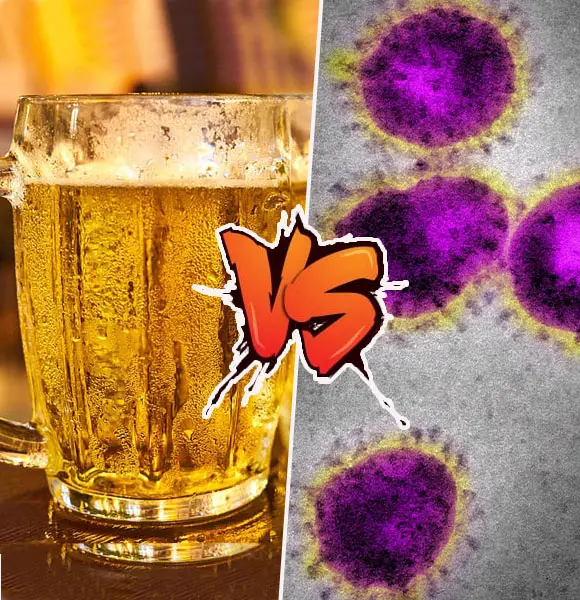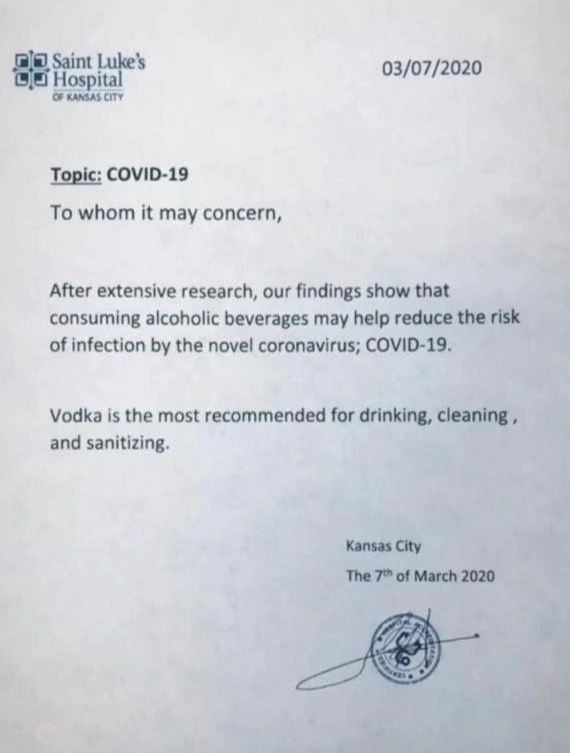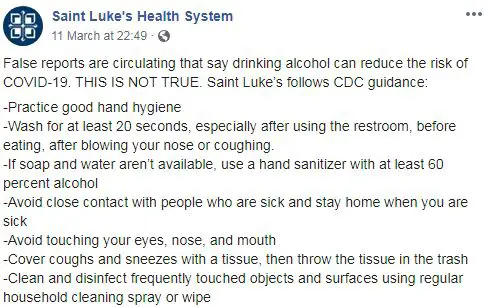Alcohol Vs. Coronavirus! Here's Why You Mustn’t Follow The Myth

120 countries infected within 4 months; Coronavirus indeed is a pandemic!
With cases of coronavirus on the rise across the world, several misinformation and myths are spreading as well. One of the rumors that has taken the internet by storm is the claim that alcohol consumption can prevent and even possibly reduce the infection of the coronavirus. But is the claim valid or just a myth that puts the lives of many at risk?
Alcohol Cures Coronavirus: A Myth Or Fact?
As fictitious as the whole thing sounds, alcohol curing Coronavirus is indeed a mere myth. So, where did all of the talk come into being?
The rumors about alcohol's potential to ward off coronavirus started to spread after a Facebook group by the name of "After Drinking Confessions" posted a photo.

The false information posted by Facebook group After Drinking Confessions regarding Alcohol's potential to prevent from coronavirus (Photo: indiatoday.in)
As shown in the above picture, the fake information is addressed in the name of Saint Lukes Hospital located in Kansas City, with its logo. Moreover, the letter states the hospital came to a conclusion through research that alcohol might reduce the risk of infection from coronavirus.
Sophie Grégoire Tested Positive For Coronavirus:- How Did She Get Diagnosed With Coronavirus?
But, it is a fake announcement; as per the official announcement by Saint Lukes hospital, no such advisory post was circulated by them. Moreover, the organization released a statement through its Facebook page on 11th March 2020, clarifying that alcohol didn't reduce the risk of COVD-19.

Saint Lukes Hospital's credible post on Coronavirus prevention from 11th March 2020 (Photo: Saint Luke Hospital's Instagram)
So, following unverified posts and myths relevant to coronavirus can be detrimental to health as much as the virus itself.
World Health Organization (WHO)'s Clarification
The World Health Organization has issued clear warnings on the alcohol curing coronavirus myth.
On 21st February 2020, along with a picture, the non-profit organization clearly summed up that alcohol consumption didn't cure coronavirus. Since the population that is non-drinkers might take up the habit after falling into the trap of fake news, WHO clearly stated that drinking definitely wouldn't help.
Instead, WHO recommends people who consume alcohol to drink in moderation.
Why To Ignore Myths Immediately
On 10th March 2020, USA Today reported that more than 44 people in Iran had lost their lives after consuming toxic alcohol in an effort to treat coronavirus.
Alcohol is banned in Iran by law, which has resulted in bootleggers selling unauthorized and tampered alcohol in the midst of the coronavirus pandemic.
But as evident, the situation has gotten worse due to the myth that spreading that drinking alcohol can cure and prevent coronavirus that causes COVD-19.
Is Alcohol Totally Useless Against Coronavirus?
Coronavirus has a protein envelope structure that alcohol can attack. As a result, alcohol is used in hand rubs and sanitizers. But this information has led to netizens making their own hand sanitizers through vodka, which is definitely not recommended by the CDC (Centre For Disease Control) and vodka brands themselves.
Non-Alcoholic Drink:- What is Ginger Beer? Its Benefits and Calories Amount
Yes, on 5th March 2020, vodka brand Tito's Vodka immediately replied to a user who expressed through Twitter that she had been using their vodka to make her personal hand sanitizer.
The brand has made it clear not to do so as their product only contains 40% alcohol, whereas CDC recommends sanitizers with 60% alcohol at the least.
So, it is best to look over the label carefully of the hand sanitizer you have been using recently.